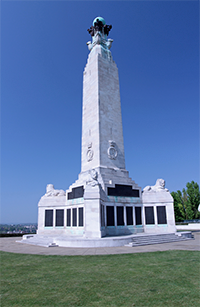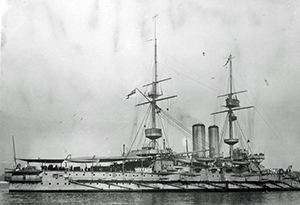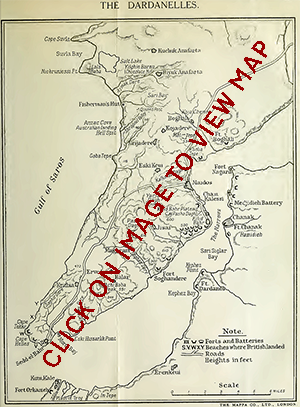First World War Project
Stephen CHAMP (of Teynham)
bapt. 8th August 1871 Chief Stoker, 280890 |

There are very few personal military records surviving for Stephen Champ. We do know that his widow was sent his medals - 15-Star, Victory Medal, British War Medal having been "killed or died as a direct result of enemy action." Probate records (London Administration) reveal that Stephen's home was 2 Triggs Cottages, Barrow Green, Teynham, Kent. The probate decision of 9th October awarded effects of £192 13s. 3d. to his widow, Frances Louisa Emily Champ (née Miles). Stephen Champ married Frances Louisa Emily Miles on Christmas Day 1913 in Teynham Church and they had one child, whom Stephen never saw.
Stephen's parents were James (whose brothers and sisters were also born in Lynsted) and Sarah Champ (from Doddington). Stephen was one of nine children - brothers, Henry John, George, and James; sisters, Mary Ann, Sarah, Emily, Lucy and Frances.
Local newspaper, the Faversham and North East Kent News reported Stephen's death on 12th August 1915 tells us bit more about Stephen: "Chief Stoker Stephen Champ, one of several hundred men who went down with H.M.S. Goliath, which was torpedoed at the Dardanelles, belonged to Barrow Green and, was about 44 years of age. Deceased had served nearly 20 years in the Navy and held the good conduct medal. He leaves a wife and one little child not yet a year old. This child he had never seen, as he had not been home since the outbreak of war. Mrs Champ is a daughter of Mr John Miles, of Barrow Green. She has a brother in The Buffs who has been twice wounded.
| The East Kent Gazette of 12th June 2017 |
| "TEYNHAM MAN'S DEATH AT THE DARDANELLES. Mrs Frances Champ, of Barrow Green, has received the sad news that her husband, Chief Petty Officer Stephen Champ, of H.M.S. "Goliath", died on May 13th, as the result of the sinking of that vessel by a torpedo, in the operations at the Dardanelles. Mr Champ was rescued from the sea, but died half-an-hour afterwards. The deceased officer, who was 44 years of age, is believed to be the first Teynham sailor to lose his life since the war commenced. Chief Petty Officer Champ was a native of Teynham, and he was well known and respected. He had seen nearly 20 years' service. He leaves a young widow and a daughter of nine months, and much sympathy is felt for Mrs Champ in her sad bereavement. A memorial service is to be held at Teynham Church to-morrow (Sunday) afternoon." |
So, with so little else known about this man, we must turn to the circumstances of his death.
Circumstances of the Death of Chief Stoker Stephen Champ
 Stephen Champ, Chief Stoker aboard H.M.S. Goliath, was a casualty of the expansion of conflict to the Dardanelles/Gallipoli. This series of actions proved to be the undoing of the Secretary of State for War - Winston Churchill. During the period before this loss of H.M.S. Goliath, there was a crisis of confidence in military circles over the level of naval presence in the North Sea to hold the naval defensive position at a time when the land battle had become largely static.
Stephen Champ, Chief Stoker aboard H.M.S. Goliath, was a casualty of the expansion of conflict to the Dardanelles/Gallipoli. This series of actions proved to be the undoing of the Secretary of State for War - Winston Churchill. During the period before this loss of H.M.S. Goliath, there was a crisis of confidence in military circles over the level of naval presence in the North Sea to hold the naval defensive position at a time when the land battle had become largely static.
On 13th May 1915, HMS Goliath, a Canopus-class pre-Dreadnought battleship, was reassigned from duty on the coast of German East Africa to support the proposed action against Turkey in the Mediterranean. Faced with this shelling of Turkish positions, German Lieutenant Commander Firle took command of the Turkish destroyer/torpedo boat, Muavenet-I-Miliet, and under cover of fog made to attack HMS Goliath and HMS Cornwallis. When challenged, she was able to fire her three loaded tubes and escaped into the night. This was a very daring operation that showed how vulnerable British ships were when asked to stand off the mainland in relatively smooth seas to offer support to the French land forces on the peninsula.
All three torpedoes hit the Goliath in close succession. She sank only eight minutes after the first impact. Some accounts state four minutes to sink.
[*extract found through the expert, specialist naval history web site - www.naval-history.net. You can also read these volumes through the superb historical resource the Internet Library]
As a Chief Stoker, Stephen Champ would have been amongst the most vulnerable to torpedo attack with little chance of survival as he joined the two-thirds of the ship's complement that perished.
We have also transcribed an Official Despatch (and inserted maps) dated 20th May 1915 that covers this period as background to our understanding of what was happening in the Mediterranean from early April 1915.
| Stephen's short obituary in the Faversham and North East Kent News of 12th June: |
| "Chief Stoker Stephen Champ, one of several hundred men who went down with H.M.S. Goliath, which was torpedoed at the Dardanelles, belonged to Barrow Green and, was about 44 years of age. Deceased had served nearly 20 years in the Navy and held the good conduct medal. He leaves a wife and one little child not yet a year old. This child he had never seen, as he had not been home since the outbreak of war. Mrs. Champ is a daughter of Mr. John Miles, of Barrow Green. She has a brother in The Buffs who has been twice wounded." |


 World War 1 Pages
World War 1 Pages